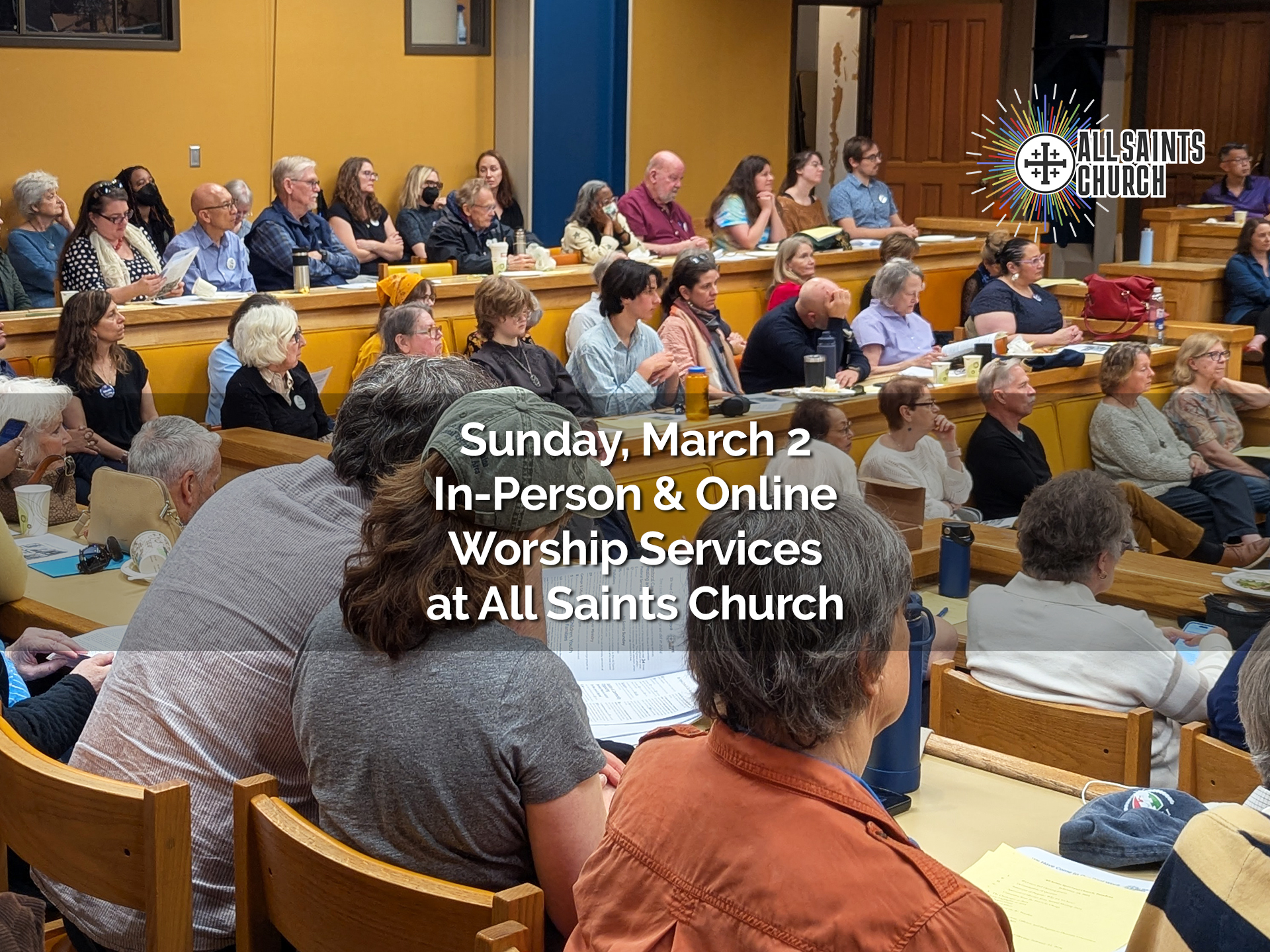First Sunday in Advent – Mark 13:24-37
Jesus said to his disciples, ” “In those days, after that time of distress, the sun will be darkened, the moon will lose its brightness, the stars will fall from the sky and the powers in the heavens will be shaken. Then they will see the Promised One coming in the clouds with great power and glory; then the angels will be sent to gather the chosen from the four winds, from the ends of the earth to the ends of heaven. Take the fig tree as a parable: as soon as its twigs grow supple and its leaves come out, you know that summer is near. In the same way, when you see these things happening, know that the Promised One is near, right at the door.
The truth is, before this generation has passed away, all these things will have taken place. Heaven and earth will pass away, but my words will not pass away. But as for that day or hour, nobody knows it — neither the angels of heaven, nor the Only Begotten — no one but God. Be constantly on the watch! Stay awake! You do not know when the appointed time will come. It is like people traveling abroad. They leave their home and put the workers in charge, each with a certain task, and those who watch at the front gate are ordered to stay on the alert. So stay alert! You do not know when the owner of the house is coming, whether at dusk, at midnight, when the cock crows or at early dawn. Do not let the owner come suddenly and catch you asleep. What I say to you, I say to all: stay alert!”
The Backstory – What’s Going On Here?
This Sunday is the First Sunday in Advent, which means we move to a new year in the lectionary cycle. Last year, we were in Year A, which is dominated by Matthew. Now we begin Year B, which is dominated by Mark.
Mark is the shortest of the Gospels, is widely believed to be the first of the four canonical Gospels written (and is therefore primary source material for the others), and is very fast-paced. It doesn’t have the poetry of John. It isn’t aimed at a Gentile audience like Luke or laser-focused at a Jewish audience like Matthew. Mark tells the story.
This section of Mark (Chapter 13) is part of what is called “The Little Apocalypse.” Versions of it also occur in Matthew 24 and Luke 21. Jesus has just finished teaching in the Temple and, as he is leaving, predicts the
Temple’s destruction. Then he returns to the Mount of Olives and continues with this passage.
A few things to chew on:
*”Keep awake” The Greek word here is gregoreo, which is about more than just staying conscious. Probably a better translation is “keep your wits about you.” We begin Advent with this passage in the middle of Mark’s
Gospel because gregoreo is the posture of Advent. Looking forward to Jesus coming is not about pulling an all-nighter studying for a test or even the disciples trying to stay awake in Gethsemane while Jesus prays. It is being
discerning and alert to the presence of Christ that is emerging. It is always asking the question “is that Christ?”
*Jesus quotes two pieces of Isaiah here. The verse about the sun darkened and the moon not giving light is from Isaiah 13:10 and it is about the fall of Babylon, which will be Israel’s deliverance. The reference to the stars
falling is Isaiah 34:4 and is about God’s judgment on the nations. Both are about seemingly unassailable powers being as nothing compared with the power of God. What powers do we feel are unassailable? What forces do we
face that leave us feeling helpless? Do we believe in a God that is bigger than those … and if so, how does that God invite us to live?
Try This:
Our funeral liturgy reminds us that “in the midst of life we are in death.
“Yet even at the grave we make our song:
Alleluia
Alleluia
Alleluia”
That doesn’t mean that we don’t grieve loss but that endings and loss never get the last word. That Christ is always present, and that presence is always a destiny of joy.
This week, take some time each morning to consider the endings in your life. What things — especially things that are dear — are drawing to a close. Where are the goodbyes? Then spend a few minutes in prayer asking God to show you God’s presence in the midst of the endings. Ask God to show you where life is in the midst of death. Ask God to show you where the chorus of Alleluia might be rising up.
New Year’s Day
All is quiet on New Year’s Day
A world in white gets underway
I want to be with you, be with you night and day
Nothing changes on New Year’s Day – U2
The first Sunday of Advent is the beginning of a new liturgical year. For the church, it is New Year’s Day.
The beginning of a new year is an utterly random event. It is the arbitrary selection of one point in the earth’s journey around the sun. There is nothing special about it.
Nothing changes on New Year’s Day.
And yet…
Beginnings are important, no matter how arbitrary they are.
This new year begins a new story. It begins a new story of scripture – this time told through the lens of the writer of Mark’s Gospel. It begins a new journey through the seasons of the church year beginning with a season of preparation and expectation.
As the Night Prayer in the New Zealand Prayer Book says:
The night heralds the dawn.
Let us look expectantly to a new day,
New joys,
New possibilities.
It is all too easy for us to lose hope.
It is all too easy for us to think our divisions are intractable,
our wounds are unhealable,
our stories are bound to remain the same.
It’s all too easy to say:
New Year’s Day?
Big deal.
Nothing changes on New Year’s Day.
And then we remember.
We remember that on one of those journeys around the sun, God looked down and kissed the earth. That God’s love broke through in the form of Jesus. On one of those journeys around the sun there was a New Year’s Day that something changed, something shifted.
And it could happen again.
It could happen in us.
It could happen today.
U2 sings…
Under a blood red sky
A crowd has gathered in black and white
Arms entwined, the chosen few
The newspapers says, says
Say it’s true, it’s true.
And we can break through.
Though torn in two
We can be one.
I, I will begin again.
I will be with you again.
Let’s come together this New Year’s Day.
Let’s embrace a new day.
New joys.
New possibilities.
In a world deeply divided, let us believe that though torn in two, we can be one.
In a world deeply wounded and suffering and wondering if God has abandoned us, let us hear the prophet cry “Oh, that you would rend the heavens and come down.”
In a world that tells us that there is no hope, let us join hands and sing.
We will begin again.
We will be together again.
Everything can change on New Year’s Day.
. . . . . . . . . . . . . . . . . . . . . . .
Check out the rest of Sunday’s readings
The Lectionary Page has all of the readings for this Sunday and every Sunday – [1]just click here[2].
Collect for Sunday: Pray this throughout the week as you gnaw on this Gospel.
Almighty God, give us grace to cast away the works of enslavement, and be clothed in the hope of liberation, now in the time of this mortal life in which your Son Jesus Christ came to visit us in great humility; that in the last day, when he shall come again in his glorious majesty to judge both the living and the dead, we may rise to the life immortal; through him who lives and reigns with you and the Holy Spirit, one God, now and for ever. Amen.
Want to read more?
[3]“The Text This Week” is an excellent online resource for anyone who wants to dive more deeply into the scriptures for the week.
. . . . . . . . . . . . . . . . . . . . .
References
1. http://www.lectionarypage.net/YearB_RCL/Advent/BAdv1_RCL.html
2. http://www.lectionarypage.net/YearA_RCL/Pentecost/AProp29_RCL.html
3. http://www.textweek.com/



